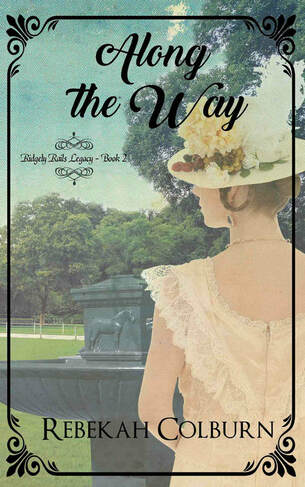| Excerpt from ALONG THE WAY, Chapter 23 The protesters gathered around the leaping flames in the urn, waving their banners and reminding the spectators what the purpose of the watchfire demonstrations had been. The crowd began to grow until thousands of bystanders had amassed around the women. Sophie could feel sweat forming beneath her wool coat despite the cold temperatures. Belle and Louisa glanced at her nervously. They all knew that when the final statement was made, all hell was going to break loose. Miss Sue White of Tennessee and Mrs. Gabrielle Harris of South Carolina held up a black and white sketch, two feet high, of Woodrow Wilson for the onlookers to see. Then, ceremoniously, it was lowered into the fire representing freedom. The edges of the paper blackened and curled, then it sparked and erupted into an orange blaze that crackled as it devoured the visage of the President of the United States. An uproar arose. Mrs. Henry O. Havemeyer of New York, master of the ceremonies began to speak, "Every Anglo-Saxon government in the world has enfranchised its women. In Russia, in Hungary, in Austria, in Germany itself, the women are completely enfranchised, and thirty-four women are now sitting in the new Reichstag. We women of America are assembled here today to voice our deep indignation that American women are still deprived of a voice in their government at home. We mean to show that the President—" |
Any woman who appeared to be in connection with the NWP, whether she wore a sash and carried a banner or not, was seized and arrested. Some brave women scheduled to speak at the ceremony began to shout over the noise of the melee, while others were too afraid to make a sound. All of them were arrested. When the police vans present were filled, more were sent to Pennsylvania Avenue to collect the remaining female protesters as less than half of them had been taken captive.
Sophie’s heart slammed against her ribcage as she was tossed about in the chaos of shouting bystanders, indignant police officers, and angry suffragists. Louisa grabbed hold of her hand, her eyes wide with terror.
“Let’s go!” Belle said, beckoning them to follow her. Many of the others had already fled. It was the leaders and the staunchly dedicated who held their ground and argued with the police.
Belle disappeared into the crowd, her petite form quickly swallowed up in the mass of bodies. Sophie made to follow, Louisa still clinging to her. A jerk on her arm spun Sophie around and she saw that one of the officers had grabbed Louisa. A fierce protectiveness rose up inside her. She wasn’t going to allow Louisa to be hauled to jail with a fragile life still growing inside her. Charging at the officer, she hit him squarely in the chest. Startled, he released Louisa.
“Run!” Sophie ordered, not waiting to see if Louisa obeyed. She pushed against the officer, demanding his full attention, shouting anything that came to mind to keep him from pursuing her friend.
The policeman scowled hatefully at Sophie, his fingers biting into her wrists as he hauled her through the crowed and roughly disposed of her within the police wagon. Other officers guarded the prisoners from escape. Three more women were tossed into the van, then the order was given to take them away.
Since freedom of expression was preserved by the first amendment, the protesters of the first watchfire demonstration had been charged with lighting a fire in the District of Columbia between the hours of sunrise and sunset. At times the charge was, “disorderly conduct,” and today it was assumed that they would be held for “obstructing traffic” or some other equally trivial misdemeanor.
Though she was terrified, Sophie was proud that they had achieved their goal of rekindling interest in the suffrage movement. Such an exhibition at this would be plastered all over the newspapers nationally and abroad. She only hoped Louisa had safely escaped.
Police delivered them to the district jail to be held overnight. They would be tried in the morning. Sophie stared in horror at the tall, brick building where genuine criminals were housed.
“Don’t worry, honey,” one of the women in the wagon with her said, “they’ve reduced sentences to five days now because they don’t know what else to do. We always go on a hunger strike when they arrest us, and they don’t want it to last for longer than that or they appear cruel and abusive. Be strong and remind yourself that it will be over soon. The strength and power you possess is in your mind and your will. They can take our bodies captive, but they can’t take our spirit unless we surrender it.”
Sophie had never felt raw fear before this moment. She’d read about it in books, described as if a hand of ice was grasping the heart, squeezing with an unforgiving fist. It has always sounded dramatic, poetic even. But in this moment, as her blood turned cold and pressure constricted her chest, she realized it wasn’t a dramatization. It felt exactly as it had been described.


 RSS Feed
RSS Feed